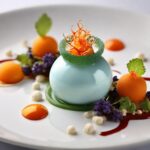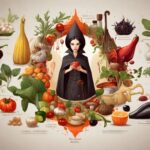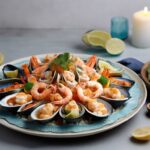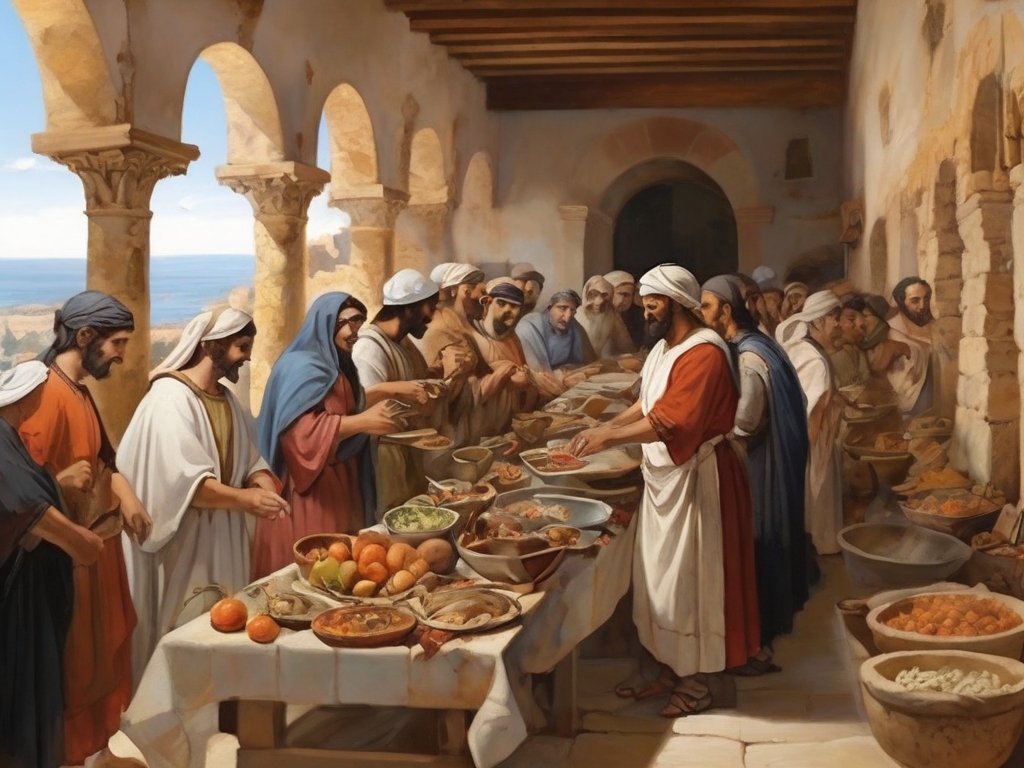Gastronomy is an ancient art that goes beyond the simple preparation and consumption of food. It is a reflection of beliefs, traditions, and myths that have been passed down through generations, enriching the human experience and connecting us with our cultural roots. Behind each ingredient lies a fascinating story that deserves to be explored, a narrative that adds depth and meaning to our relationship with food. In this extensive analysis, we will immerse ourselves in the fascinating world of the myths and legends surrounding food, exploring the stories behind some of the most iconic ingredients in world cuisine.
Garlic: Guardian of Body and Soul
Garlic, with its pungent aroma and intense flavor, is one of the most versatile and revered ingredients in world cuisine. However, its significance goes beyond its culinary use; garlic has been the subject of myths and legends since time immemorial, associated with a wide range of beliefs and superstitions. In ancient Greece, it was believed that garlic bestowed courage and protection upon athletes before competing in the Olympic Games, while in medieval Europe, it was thought to have the power to repel vampires and other evil creatures. Although many of these myths have been debunked by modern science, garlic continues to be valued for its purported health benefits, ranging from cholesterol reduction to cold and flu prevention.
The Pomegranate: Symbol of Fertility and Rebirth
The pomegranate, with its bright red seeds and sweet-tart flavor, is a symbol of fertility and prosperity in many cultures around the world. In Greek mythology, the pomegranate was associated with the goddess of fertility, Demeter, and was considered a divine gift to humanity. According to legend, the pomegranate was created by Hades, the god of the underworld, as a wedding gift for Persephone, Demeter’s daughter. However, the fruit of the pomegranate is also linked to tragedy, as in the story of Persephone, eating a pomegranate seed condemns her to spend part of the year in the underworld. This duality between life and death, fertility and seasonality, has made the pomegranate a powerful symbol in many cultures, from the Mediterranean to the Middle East.
Mandrake: Root of Power and Mystery
Mandrake, with its human-like form and reputation as a magical plant, has been the subject of fascination and fear since ancient times. In Greek mythology, mandrake was believed to be the blood of Aphrodite, the goddess of love, which fell to the ground when Adonis was killed by a wild boar. In medieval Europe, it was said that mandrake grew under the gallows of the condemned and that its scream when pulled from the earth could kill anyone who heard it. These myths gave rise to a range of superstitions and magical practices, such as carrying a mandrake root as an amulet or using it in love potions and spells. Although mandrake has lost much of its aura of mystery in modern times, it remains a fascinating plant that sparks the imagination and curiosity of people around the world.
Blue Cheese: Culinary Treasure and Source of Legends
Blue cheese, with its strong flavor and distinctive blue-green mold, is one of the most iconic and revered cheeses in the world. Its origin dates back to ancient Rome, where it is said to have been discovered by accident in the caves of Roquefort, in southern France. According to legend, a young shepherd left his bread and cheese dinner in a cave while chasing a beautiful girl. Upon returning months later, he discovered that his cheese had transformed into something new and delicious. Since then, blue cheese has been considered a delicacy fit for kings and emperors, with a history full of mystery and romance. Over the centuries, blue cheese has been associated with opulence and luxury, but also with craftsmanship and tradition, becoming a symbol of the culinary and cultural wealth of the world.
Chocolate: Divine Delight and Source of Earthly Pleasures
Chocolate, with its rich flavor and tempting aroma, is one of the most indulgent and addictive pleasures in the world. Its history dates back to ancient Mesoamerica, where it was considered a gift from the gods and used in religious ceremonies and rituals of sacrifice. The Aztecs believed that cacao had magical and aphrodisiac properties, and valued it more than gold. With the arrival of the Spanish, chocolate was brought to Europe, where it became a beverage exclusive to the nobility and royalty. Over the centuries, chocolate has been associated with love, passion, and indulgence, but also with health and well-being. This duality between pleasure and virtue, earthly and divine, has made chocolate a recurring theme in art, literature, and popular culture throughout the ages.
Mushrooms: Bridges Between the Natural and Supernatural Worlds
Mushrooms, with their diversity of shapes and colors, are among the most fascinating and mysterious organisms in the plant kingdom. Throughout history, mushrooms have been objects of veneration and fear, associated with a wide range of beliefs and superstitions. In ancient India, mushrooms were believed to be the food of the gods and consuming them could lead to spiritual enlightenment. In Aztec culture, hallucinogenic mushrooms were used by shamans to communicate with the gods and perform healings. Although mushrooms have been stigmatized and prohibited in many parts of the world, they have also experienced a renaissance in alternative medicine and psychotherapy, with studies suggesting their potential to treat mental disorders such as depression and anxiety.
The Apple: Forbidden Fruit and Symbol of Temptation
The apple, with its round shape and sweet, refreshing flavor, is one of the most popular and versatile fruits in the world. However, its reputation is marked by the story of the Garden of Eden, where it is said to have been the forbidden fruit that led to the fall of man. In Greek mythology, the golden apple of discord was the cause of the Trojan War, while in Norse tradition, the apple was the food of the gods, granting them eternal youth. Throughout history, the apple has been associated with temptation and sin, but also with fertility and immortality. This duality between good and evil, light and darkness, has made the apple a powerful symbol in many cultures and religions around the world.
Wine: Elixir of Life and Source of Sensory Pleasures
Wine, with its intoxicating aroma and sublime flavor, is one of the oldest and most revered beverages in the world. Its history dates back to antiquity, where it was considered a gift from the gods and used in religious ceremonies and communion rituals. In Greek mythology, wine was said to be a gift from Dionysus, the god of wine and fertility, to humanity, and had the power to inspire ecstasy and divine revelations. Over the centuries, wine has been associated with celebration, joy, and camaraderie, but also with excess and decadence. This duality between the sacred and the profane, the divine and the human, has made wine a symbol of the culture and civilization of the world.
Cinnamon: Spices and Legends that Awaken the Senses
Cinnamon, with its warm aroma and spicy flavor, is one of the oldest and most revered spices in the world. Its history dates back to antiquity, where it was considered a precious treasure and used in religious ceremonies and embalming rituals. In ancient China, cinnamon was considered a gift fit for emperors and gods, and was used in traditional medicine to treat a variety of ailments, from digestive problems to respiratory diseases. Over the centuries, cinnamon has been associated with prosperity, health, and well-being, but also with mystery and exoticism. This duality between the familiar and the exotic, the sacred and the profane, has made cinnamon a revered spice in all cultures and civilizations of the world.
Olive Oil: Golden Treasure of Nature
Olive oil, with its fresh aroma and fruity flavor, is one of the most prized and versatile oils in the world. Its history dates back to antiquity, where it was considered a gift from the gods and used in religious ceremonies and purification rituals. In Greek mythology, olive oil was said to be a gift from Athena, the goddess of wisdom, to humanity, and had the power to heal wounds and nourish the soul. Over the centuries, olive oil has been associated with health, longevity, and prosperity, but also with spirituality and connection to nature. This duality between the earthly and the divine, the material and the spiritual, has made olive oil a symbol of the cultural and culinary wealth of the Mediterranean.
Conclusions: Exploring the Deep Roots of Gastronomy
Gastronomy is much more than a simple physiological need; it is an expression of our identity and our history, a window into our culture and traditions. Through the myths and legends surrounding food, we connect with our deepest roots and discover the magic and mystery hidden in every bite. As we explore the stories behind the most iconic ingredients in world cuisine, we realize that food is much more than a nutritious substance; it is a bond that connects us to our past, our present, and our future. In every dish, in every recipe, in every ingredient, we find a story waiting to be told, a story that reminds us that food is the soul of culture and the heart of humanity.
Explore our e-shop and take your culinary experience to the next level! At Cooking Landia, we have carefully selected the finest kitchen utensils and products for you. From high-quality chef’s knives to durable cookware, and innovative culinary gadgets, you’ll find everything you need to equip your kitchen like a true professional. Discover our curated collection and choose the products that will make cooking even more exciting and efficient. Visit our e-shop now and turn every moment in the kitchen into an extraordinary experience! 🍳🔪🍴
More content
- 10 Latin American Sweets: Tempting Dessert Adventures Await

- 15 Foods to Maintain a Balanced and Nutritious Diet

- 5 Great Gastronomic Moments: Historic Milestones in the Cuisine

- 6 Healthy Recipes for a Balanced and Delicious Diet

- A Gastronomic Journey: Migratory Influences in the Cuisine

- Art of Fruit and Vegetable Cutting: Expert Techniques Revealed

- Boost Your Immune System: The Best 10 Foods

- Comida Callejera en el Mundo: Historia y Platos Típicos

- Complete Guide to Cooking Methods: Everything You Need to Know

- Complete Guide to Gluten-Free Diets: Tips for Beginners

- Complete Guide: Enhance Your Dishes with Fresh Herbs

- Culinary Globalization: Exploring 6 Iconic World Dishes

- Culinary Innovations: The Most Impactful Gastronomic Trends

- Culinary Journey: Discovering Culinary Traditions from Different Cultures

- Culinary Secrets Unveiled: Elevate Your Cooking with Simple Ingredient Tricks

- Dietary Plans for Food Allergies: Top 10 Tips and Recommendations

- Easy Gluten-Free Recipes for Every Day of the Week

- Efficiency Unleashed: Explore the Art of Mise en Place

- Exploring Flavors: Top 10 Typical Dishes of Latin America

- Flavors of the World: A Journey Through Diverse Culinary Influences

- From Farm to Table: How to Select Quality Meat

- From Fusion to Tradition: 4 Global Gastronomic Trends

- Gastronomía egipcia: dieta y recetas ancestrales

- Gastronomy and Folklore: Culinary Traditions and Local Myths

- Healthy and Affordable Recipes: Eating Well Without Spending Much

- Healthy Breakfasts: 7 Nutritious Recipes for the Whole Week

- Historia del Chocolate: De los Aztecas al Presente

- Homemade Sushi: Simple Steps to Prepare Your Favorite Rolls

- How to Choose the Best Poultry for Your Recipes

- Iconic Dishes of Spanish Cuisine by Region

- Innovation in Cuisine: Gourmet Products in Traditional Recipes

- Low-Carb Diet: A Beginner’s Guide

- Low-Carb Diets: Top 10 Recommended Foods

- Master Your Kitchen: 10 Unexpected Tips for Easy Cooking

- Mastering Healthy Cooking: Unveiling 4 Low-Fat Secrets

- Menus for Allergen-Free Diets: The Best Recipes and Nutritional Strategies

- Myths and Legends: The Magical Stories Behind Foods

- Perfect Pairing: Wines and Dishes for Gastronomic Celebrations

- Probiotic Foods: How Do They Improve Your Digestive Health?

- Protein Sources in a Vegan Diet: What to Do?

- Revealing the Superfood Potential of Red Fruits: Benefits & Recipes

- Secrets of Asian Cuisine: Discovering 8 Traditional Techniques

- Secrets of Latin American Cuisine: Traditional and Authentic Recipes You Must Try

- Simple Mediterranean Cooking for Beginners: Impress Your Guests!

- Spices Through Time: Understanding Their Historical Importance

- Starting Out in the Kitchen: Pro Chef Tips for Beginners

- Sustainable Dishes: Gastronomic Trends for a Greener Future

- Symbolism of Food: The Meaning in Every Bite

- Taste of the Mediterranean: 5 Key Dishes

- Taste the Best of Africa: Top 5 Iconic Regional Recipes

- The 10 Most Exclusive Gourmet Products You Must Try

- The Evolution of Food: Traditional vs. Modern Cuisine Compared

- The Great Masters of Cuisine: Contributions to its Evolution

- The Most Impactful Gastronomic Trends Shaping the World

- The Secrets of African Cuisine: Traditional Recipes and Flavors

- The Secrets of Perfect Seafood Cooking: Kitchen Tricks

- Title: Culinary Traditions in Festivals: Festive Flavors of the World

- Unlock Your Culinary Potential: Beginner’s Guide to Essential Techniques

- Vegetarianism for Beginners: Simple Steps to Adopt This Lifestyle

- White Fish vs. Blue Fish: Which is Better for Your Health?



A great post without any doubt.
Thank you so much for sharing this wonderful post with us.
The information shared is of top quality which has to get appreciated at all levels. Well done…
Nice i really enjoyed reading your blogs. Keep on posting. Thanks
A great post without any doubt.
The information shared is of top quality which has to get appreciated at all levels. Well done…
The information shared is of top quality which has to get appreciated at all levels. Well done…
The information shared is of top quality which has to get appreciated at all levels. Well done…
Thank you for sharing indeed great looking !
A great post without any doubt.
A great post without any doubt.
Thank you for sharing indeed great looking !
Thank you for sharing indeed great looking !
The information shared is of top quality which has to get appreciated at all levels. Well done…
A great post without any doubt.
Thank you for sharing indeed great looking !
Thank you so much for sharing this wonderful post with us.
Thank you so much for sharing this wonderful post with us.
The information shared is of top quality which has to get appreciated at all levels. Well done…
Thank you so much for sharing this wonderful post with us.
The information shared is of top quality which has to get appreciated at all levels. Well done…
Nice i really enjoyed reading your blogs. Keep on posting. Thanks
Thank you for sharing indeed great looking !
The information shared is of top quality which has to get appreciated at all levels. Well done…
Nice i really enjoyed reading your blogs. Keep on posting. Thanks
Thank you for sharing indeed great looking !
Thank you for sharing indeed great looking !
A great post without any doubt.
The information shared is of top quality which has to get appreciated at all levels. Well done…
A great post without any doubt.
The information shared is of top quality which has to get appreciated at all levels. Well done…
Highly descriptive blog, I loved that a lot. Will there be a part 2?
I’ve been surfing online more than 3 hours today, yet I never found any interesting article like yours. It is pretty worth enough for me. In my opinion, if all web owners and bloggers made good content as you did, the web will be much more useful than ever before.
This post provides valuable information and is a must-read for anyone looking to gain insights into the topic.
I used to be able to find good information from your content.
I’d like to express my heartfelt appreciation for this insightful article. Your unique perspective and well-researched content bring a fresh depth to the subject matter. It’s evident that you’ve invested considerable thought into this, and your ability to convey complex ideas in such a clear and understandable way is truly commendable. Thank you for sharing your knowledge so generously and making the learning process enjoyable.
This really answered my downside, thank you!
This site was… how do I say it? Relevant!! Finally I’ve found something that helped me. Many thanks!
Very useful post, thanks for the tips.